- Home
- Robert Rankin
The Chickens of Atlantis and Other Foul and Filthy Fiends Page 14
The Chickens of Atlantis and Other Foul and Filthy Fiends Read online
Page 14
‘You really think so?’ I asked Mr Bell.
‘I claim no expertise in such matters,’ said my friend, ‘but it sounds to me like a reasonable proposition.’
‘So one day this might be The Planet of the Apes?’ I said.
Mr Bell smiled. ‘Perhaps.’
‘Would you mind,’ I asked my friend, ‘if I spent a little time alone with my monkeys? There is no one else around and I would like a private moment or two in their company.’
‘Certainly,’ said Mr Bell. ‘I will meet you in the cafeteria. I noticed that they sell cider and I'm sure they will accept the wartime coinage I have in my pocket.’
So Mr Bell left me alone and I gazed into the great cage where the many monkeys skittered. And as I stood and gazed at them and wondered for the future, a rather curious thing happened. One by one, the monkeys caught sight of me standing there. And one by one as they did so, they ceased their chatter and risqué antics and took to staring at me. And soon the great cage was utterly still with every single ape therein looking at myself.
Having unexpectedly gained their attention, I addressed these apes, these fruit of my loins, as the Good Book would have put it. I addressed them in the tongue of Man and also that of Monkey.
Then did something that I probably should not have done.
And then said farewell and went to the cafeteria.
My journey to the cafeteria was not without incident.
‘Monkey on the loose!’ cried someone, and many others gave chase. I took to the trees and presently entered the cafeteria through one of the open panels of its glazed roof.
I dropped down to Mr Bell's table, causing my friend to dissolve into laughter once more.
I gave him the look and he ceased to be foolish. ‘I bought you a banana,’ he said, presenting this to me. ‘It is a Brentford banana, guaranteed to be that little bit more bananary than the average banana.’*
I took the banana gratefully. ‘How is the cider?’ I asked.
‘Just that bit more cidery.’† Mr Bell toasted me with his glass then poured a measure for me.
‘Do you have any kind of a plan?’ I asked my friend. ‘Or are we just going to bumble into the forbidden realm of the faerie and trust in the fates that we will not come to grief?’
Mr Bell eyed me and smiled once more. ‘Perhaps it is a good thing for Man that you are one of a kind,’ said he. ‘I am not sure Man is a match for you.’
I was flattered and munched at my banana.
‘We must certainly be cautious,’ Mr Bell continued. ‘I will be somewhat out of my jurisdiction, as it were. We will sip some more of this excellent cider then return to the Marie Lloyd, where I will study certain books in my travelling library. Then, well armed, we will sally forth before the hour of midnight.’
‘What could possibly go wrong?’ I said.
Which was, of course, a rhetorical question.
Brentford boasts beautiful sunsets. You even get the green flash, which otherwise you only see in the tropics. Parrots flock from Gunnersbury Park to their night nestings in the Royal Gardens of Kew. A giant feral tomcat howls upon the allotments. Bats circle over the Butts Estate. And perhaps, just perhaps, the Brentford griffin flies.
Mr Bell was engrossed in his researches and so we did not go out for dinner. Rather we dined upon what provisions we possessed, which were limited, and neither of us cared much for that porridge.
Mr Bell's carriage clock (a gift from someone or other for solving such and such a thing)* struck half-past the hour of eleven, and the two of us, now looking as if we were dressed for battle (which to a degree we were), set out from the time-ship en route to Fairyland.
Mr Bell held up his compass and followed its pointing needle. He wore what is known as a safari suit – a khaki jacket equipped with many pockets, accompanied by a heavy belt hung with ray guns and weaponry. Jodhpurs and riding boots and a big-game hunter's pith helmet fitted with night-vision goggles completed the ensemble. The hand unoccupied by compass swung a large stout stick.
I wore an all but identical get-up. Mine, however, was somewhat better tailored than that of Mr Bell.
I carried no heavy arsenal, but had in my pockets a number of items which my friend assured me might well save our lives and should be carried with care.
Which was comforting.
I also took the precaution of hanging a police whistle about my neck on a piece of string.
Which, for reasons of my own, I found even more comforting.
Through the night-time streets of Brentford crept myself and Mr Cameron Bell. We looked severely out of place and I felt very awkward. The moonlight tinted all with a priceless silver and a soft breeze carried fragrances of night-flowering blooms. From somewhere came the sounds of a string quartet.
We plodded onwards, Mr Bell a-gazing at his compass.
‘This way,’ he whispered, and we plodded on.
And on and on . . .
And on . . .
‘We have surely plodded down this street before,’ I whispered.
Mr Bell looked baffled.
‘We are going around in circles, are we not?’
‘The compass needle keeps pointing the way,’ said the great detective. ‘But as you say, we are going around in circles.’
We stopped and Mr Bell looked up at the moon. ‘You take the compass,’ he said to me. ‘See if it is different for you.’
I took the compass and peered at its face. ‘Its needle is pointing that way,’ I said.
Mr Bell looked down at the compass. ‘It was not pointing that way when I was holding it,’ he observed. ‘Follow its pointing, Darwin.’
So I followed the compass needle and Mr Bell followed me. And soon the two of us stood in the Memorial Park.
My nose now took to twitching, for I smelled something strange.
My ears pricked up, for I heard curious sounds.
Sounds of laughter and sounds of singing, and we saw a weird pale light.
‘The entrance lies ahead,’ said Mr Bell. ‘Will you enter with me, Darwin? I wish no harm to come to you.’
‘I am brave,’ I said to Mr Bell. ‘I will enter with you.’
And so we stepped forward into the weird pale light.
The strange smell grew stronger. The jolly sounds, louder.
We entered Fairyland.
* Given the law of diminishing returns it is to be hoped that that will be the last of the ‘more so’ carry on. (R. R.).
* That better be the last. (R. R.)
† All right, make that the last! (R. R.)
* Darwin's decision to discontinue this particularly annoying and in no way amusing gag is, to say the least, commendable. (R. R.)
22
s we were entering Fairyland, I feel this episode must be told as a fairy tale. Perhaps with some fanciful and faintly amusing title, such as:
The Magnificent Monkey
and the Dangerous Detective
Cross Swords with the
Maleficent Magician.
Naturally, it would begin thusly:
Once upon a time that was not his own, there lived a magnificent monkey. He was loved by the ladies and greatly admired by the gentlemen. All who met him considered him to be the very acme of apes, the very maestro of monkeydom—*
Which is why he became the most celebrated simian in this world and all others.
Together with his best friend and business associate Cameron Bell, he brought to justice many evil-doers, righted wrongs and generally carried on in a fashion that was above reproach.
The dangerous detective, however, was sad, because a solitary individual, a king amongst criminals, evaded capture time and time again. This singular gentleman went by the name of Arthur Knapton, but preferred to be known as the Pearly Emperor.
Many and heinous were the crimes of this terrible, terrible man, made worse by the fact that he possessed a magical Egyptian stele which enabled him to travel from one time to another, there to perform yet more dreadful
deeds.
The marvellous monkey and the dangerous detective were in pursuit of the Pearly Emperor and had followed him to the very gateway of Fairyland, which was to be found within Brentford at the fifth point of the compass.
The year was nineteen sixty-seven and it was the Summer of Love.
The magnificent monkey gazed at the ombré gateway. Being an ape of literary learnings, he was put in mind of the very first chapter of Aubrey Beardsley's erotic masterwork Under the Hill.
For it is there that the Chevalier Tannhäuser, having lighted from his horse, stands doubtfully for a moment before the gateway of the mysterious hill of Venus:
The pillars were fashioned in some pale stone and rose up like hymns in the praise of pleasure, for from cap to base, each one was carved with loving sculptures, showing such a cunning invention and such a curious knowledge . . .
The Chevalier lingers not a little in reviewing these.
‘What is that naked gentleman doing with that duck?’ the ape named Darwin asked of Cameron Bell.
The great detective viewed the carved columns with fastidious interest.
‘And those ladies,’ said Darwin. ‘Is that a long cucumber they are sharing?’
‘Let us move swiftly along,’ said Cameron Bell. ‘We have much to do and must not be diverted from our task.’
‘And why has that little man got such an enormous—’
But the dangerous detective took the monkey by the hand, and together they entered Fairyland.
It is well to be wary in Fairyland, for the fairy folk ofttimes play queer pranks on those who would venture within their domain. It is written that fairies are of an order halfway between Man and the angels, and that many centuries ago, the race of Mankind drove these first folk from their lands and into the forests and wastes. How long fairies live and what they dine upon are matters for scholarly debate, as is the question regarding whether or not they are possessed of a mortal soul.
Some claim they are cacodemons, bugaboos and flibbertigibbets who would hasten Man to his destruction; others that they are wood nymphs, sylphs and sprites, who, though of impish humour, mean Mankind no harm at all.
In truth, opinions remain divided and very few truths be told.
‘Are we really in Fairyland?’ asked the magnificent monkey.
The dangerous detective nodded his big bald head, which lurked beneath his oversized pith helmet, then lowered his night-vision goggles and peered all around and about. ‘This is a very strange land,’ said he, ‘for we stand in the light of day beneath a bright blue sky, but I can see no sun at all – can you?’
The monkey shrugged and said that he could not. But that the curious smell, which had pressed upon his sensitive nostrils when first they approached the portal to the fairy world, had now intensified to a point that was almost beyond endurance. But not from malodorousness – quite the reverse. The smell was utterly delicious.
‘I smell only cinnamon,’ said Mr Bell, a-sniffing at the air.
‘I smell so much more,’ the monkey said, and composed on the spot a verse to list the fragrances that met him as he walked.
’Tis a dainty bouquet with a honeysome charm,
Sugarplum, marzipan, marmalade, myrrh.
Bewitching, beguiling, a beauteous balm,
Liquorice, lollypop, fritters and fur.
A nectarous nosegay to nuzzle the nostrils,
Sandalwood, cedarwood, parsley and pine.
Pork pies and poppadoms, pasties and pastilles,
Fruits of the forest and fruits of the vine.
A full-flavoured fancy, a savoury scent,
Tasty and toothsome and feathery-light.
Per-fum-at-ory and am-bros-i-ient,
Toffee and treacle and Turkish delight.
‘All of that?’ asked Mr Cameron Bell.
‘All of that and more,’ said the educated ape. ‘Which makes it rather hard for me to do anything other than just sniff and enjoy it.’
They stood in an Arcadian glade. Tall grasses whispered in a gentle breeze. A white fluffy cloud or two meandered across the sky. Curly-branched trees were adorned with strange fruits. Faint music drifted from somewhere.
‘Do you know what I am thinking?’ said the monkey to the man.
‘I believe I do,’ the man replied. ‘You are thinking that perhaps this is how our world was, so very very long ago, before the birth of Man.’
‘Precisely,’ said the monkey. ‘It looks like a perfect world and I feel that perhaps we should not be here.’
‘And nor should Arthur Knapton,’ said the man. ‘Let us seek him out and capture him and return to the world we know.’
The two walked on, the monkey ever more amazed by the smells that crowded upon him, the man overwhelmed by the beauty, but anxious to achieve his goal and capture the Pearly Emperor.
They climbed a hill and reached its brow, and then the man smiled and pointed. Planted fields led down to a picturesque village of red-tiled roofs and blue-bricked walls and bottle-glass windows and all medieval in its looks, quaint and at peace with the landscape. The sounds of music and jollity came louder to the ears of man and monkey.
‘We shall go and enquire within the alehouse,’ the man to the monkey said.
‘But you promise you will not shoot anyone dead unless it is absolutely necessary.’
‘You have my word. Come on.’
And so they strolled through the fields and entered the quaint little village.
Children danced about what appeared to be a maypole whilst old gentlemen sat on a bench by an alehouse door. The dangerous detective, a man who had ever upon him a healthy thirst for alcohol, noted well the mugs of grog these gentlemen held in their fists.
‘All looks to be safe enough,’ he said to his friend the monkey.
The monkey simply nodded, for he had nothing to say.
He did, however, tinker with the police whistle that hung about his neck on a length of string.
Music was provided for the dancing children by a deuce of roguish gypsy types, one of whom played a concertina, the other an old violin.
Mr Bell tipped his helmet to all and sundry and, meeting with no ill looks, entered the alehouse. It was quaintness personified, all cobbled floor, rustic stools, a counter of oak and a chap behind this counter.
‘Good day to you, sirs,’ said the chap to the man and the monkey. ‘You look as if you have travelled far and could trouble a mug of good ale.’
‘That we could,’ said Mr Bell, removing from his head his pith helmet and placing it with care upon the counter. ‘We have come from a far country and perhaps we are lost, for I know not the name of the village.’
‘Welcome to Knapton,’ said the bar-lord, drawing a mug of ale.
‘Knapton,’ said Mr Bell. ‘Knapton, indeed?’
‘The village of Knapton, in the Shire of Knapton. The prettiest village you will find in this whole country of Knapton.’
The bar-lord pushed a filled mug towards Mr Bell and took to the filling of a lesser one.
‘Is there a city of Knapton, too?’ asked Mr Bell as he tasted ale. Tasted ale and found it pleasing, too.
‘There is no city that I know of, sir. Only the castle, wherein lives the King.’
Beckoned by the bar-lord, the monkey now swarmed up onto the bar-counter, accepted his ale and took to similar tastings.
‘Castle Knapton, perchance?’ said the detective. ‘Where King Knapton lives?’
The bar-lord shook his head. ‘Castle Camelot,’ he said, ‘where good King Arthur lives.’
The monkey looked at Mr Bell.
And Mr Bell looked at the monkey.
‘Might I enquire,’ enquired Mr Bell, ‘as to whether good King Arthur has a round table and a legion of noble knights?’
‘Wouldn't be much of a king if he didn't,’ said the barlord, and then he lit a pipe.
The man and the monkey tasted more ale and smacked their lips with pleasure.
‘I hope you do not feel
that I am being rude in asking so many questions,’ said Cameron Bell.
The bar-lord shrugged his shoulders and said, ‘No.’
‘Then might I ask you whether you have ever met good King Arthur? And if you have, what exactly he looks like in the flesh?’
‘Strange you should ask me that,’ said the bar-lord. ‘I have certainly never been granted an audience with the King, as I am a commoner, me. But I know well the looks of him, as many around here do. Here, sir, let me show you this portrait of him which arrived in the morning post.’
And the bar-lord delved beneath his counter and brought forth a sheet of paper, which he placed with a certain reverence atop the counter.
The man and the monkey peered down at the portrait.
The King wore a crown as a king will do and a robe of ermine also. And there was no doubt in the mind of man or monkey that good King Arthur's second name was Knapton.
‘Good King Arthur,’ said Mr Cameron Bell.
‘Good King Arthur indeed, sir,’ said the bar-lord. ‘And please turn over the paper before you, if you will, to see something that may cause you some surprise.’
Mr Bell turned over the page. Then said, ‘Oh my dear dead mother.’
On the rear of the page was printed the word:
WANTED
In very large letters. And:
BIG REWARD FOR CAPTURE
And beneath these words were two portraits: one of a man and one of a monkey.
‘Uncommon likenesses, aren't they, sir?’ said the bar-lord.
‘I think we must be going now,’ said Mr Cameron Bell.
‘No, sir,’ said the bar-lord. ‘I think not.’
Cameron Bell drew out his ray gun. Then took to wobbling slightly on his toes.
‘We were told to expect you,’ said the bar-lord. ‘Your ales have been laced with a strong soporific – I doubt you could even make three single steps towards the door.’
Cameron Bell managed almost three.
Darwin, however, did not.

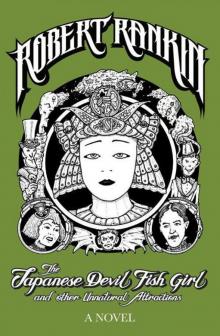 The Japanese Devil Fish Girl and Other Unnatural Attractions
The Japanese Devil Fish Girl and Other Unnatural Attractions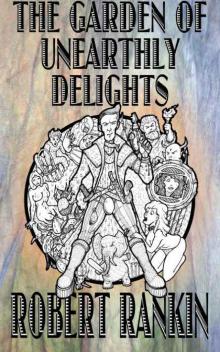 The Garden of Unearthly Delights
The Garden of Unearthly Delights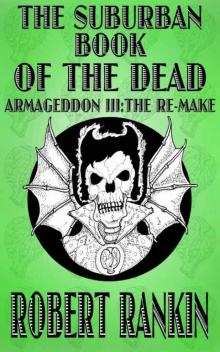 The Suburban Book of the Dead: Armageddon III: The Remake
The Suburban Book of the Dead: Armageddon III: The Remake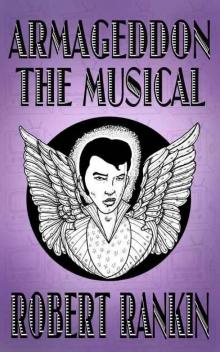 Armageddon_The Musical (Armageddon Trilogy Book 1)
Armageddon_The Musical (Armageddon Trilogy Book 1)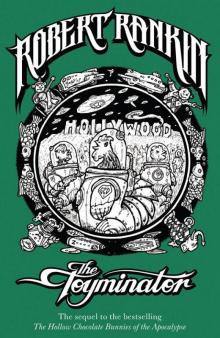 The Toyminator
The Toyminator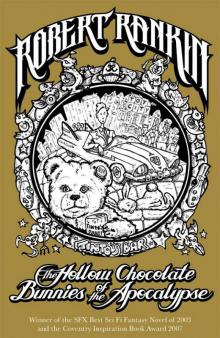 The Hollow Chocolate Bunnies of the Apocalypse
The Hollow Chocolate Bunnies of the Apocalypse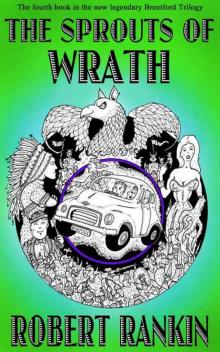 The Sprouts of Wrath
The Sprouts of Wrath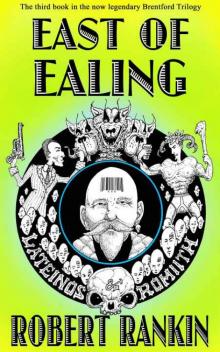 East of Ealing
East of Ealing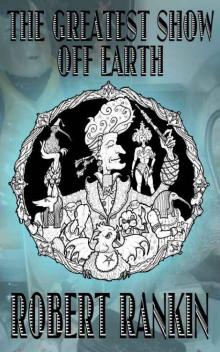 The Greatest Show Off Earth
The Greatest Show Off Earth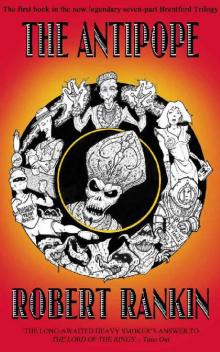 The Antipope
The Antipope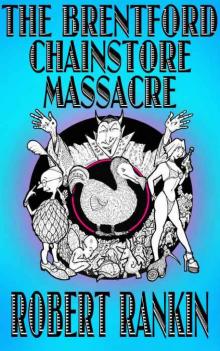 The Brentford Chainstore Massacre
The Brentford Chainstore Massacre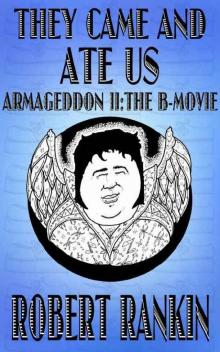 They Came and Ate Us_The B-Movie (Armageddon Trilogy 2)
They Came and Ate Us_The B-Movie (Armageddon Trilogy 2)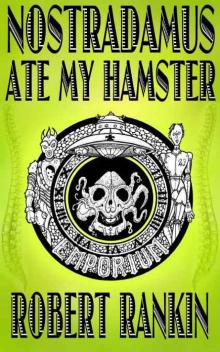 Nostradamus Ate My Hamster
Nostradamus Ate My Hamster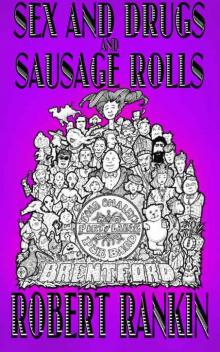 Sex and Drugs and Sausage Rolls
Sex and Drugs and Sausage Rolls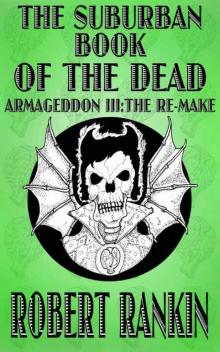 The Suburban Book of the Dead_The Remake (Armageddon Trilogy 3)
The Suburban Book of the Dead_The Remake (Armageddon Trilogy 3)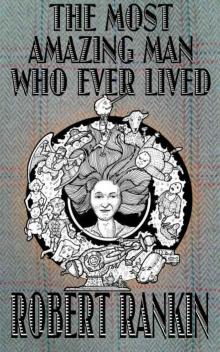 The Most Amazing Man Who Ever Lived
The Most Amazing Man Who Ever Lived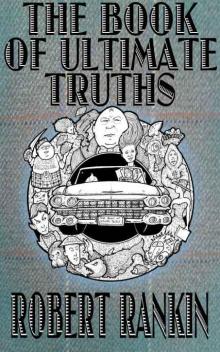 The Book of Ultimate Truths
The Book of Ultimate Truths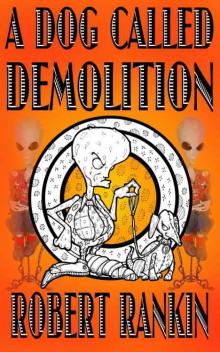 A Dog Called Demolition
A Dog Called Demolition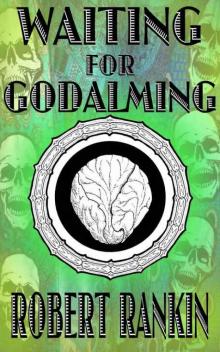 Waiting for Godalming
Waiting for Godalming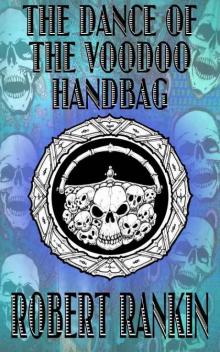 The Dance of the Voodoo Handbag
The Dance of the Voodoo Handbag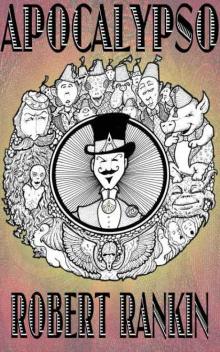 Apocalypso
Apocalypso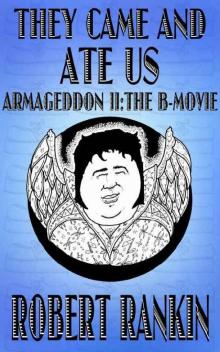 They Came and Ate Us: Armageddon II: The B-Movie
They Came and Ate Us: Armageddon II: The B-Movie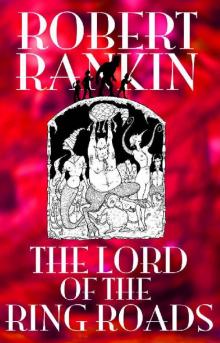 The Lord of the Ring Roads
The Lord of the Ring Roads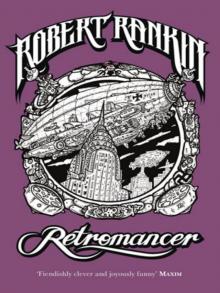 Retromancer
Retromancer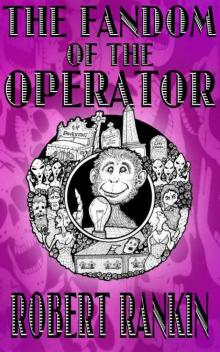 The Fandom of the Operator
The Fandom of the Operator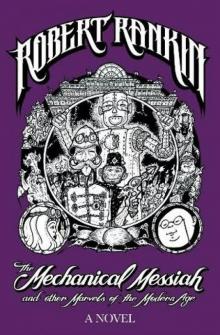 The Mechanical Messiah and Other Marvels of the Modern Age
The Mechanical Messiah and Other Marvels of the Modern Age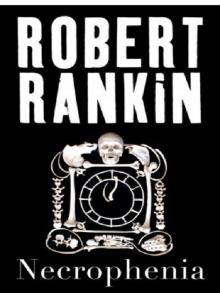 Necrophenia
Necrophenia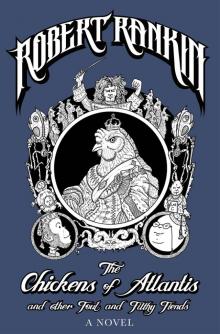 The Chickens of Atlantis and Other Foul and Filthy Fiends
The Chickens of Atlantis and Other Foul and Filthy Fiends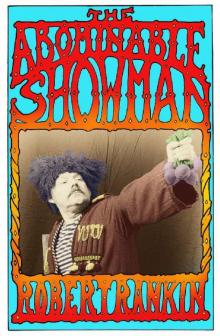 The Abominable Showman
The Abominable Showman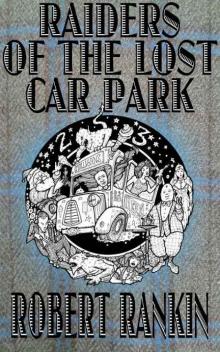 Raiders of the Lost Carpark
Raiders of the Lost Carpark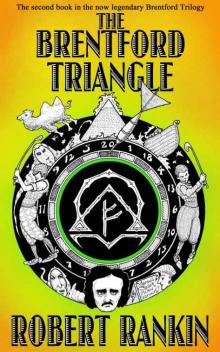 The Brentford Triangle
The Brentford Triangle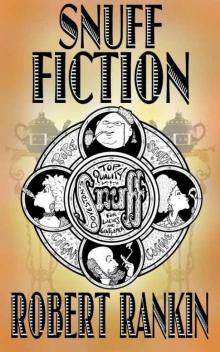 Snuff Fiction
Snuff Fiction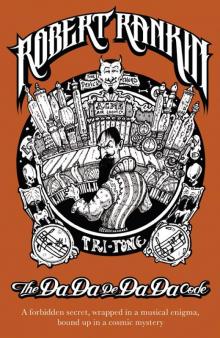 The Da-Da-De-Da-Da Code
The Da-Da-De-Da-Da Code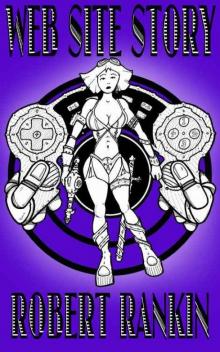 Web Site Story
Web Site Story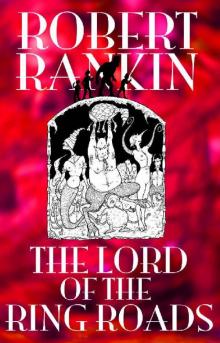 The Lord of the Ring Roads (The Final Brentford Trilogy Book 1)
The Lord of the Ring Roads (The Final Brentford Trilogy Book 1)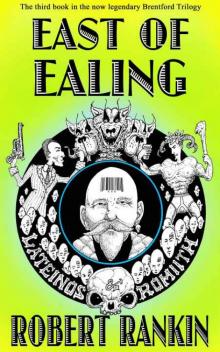 East of Ealing (The Brentford Trilogy Book 3)
East of Ealing (The Brentford Trilogy Book 3)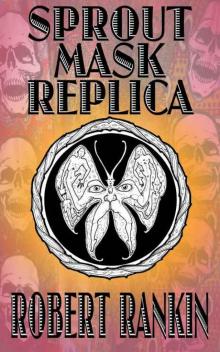 Sprout Mask Replica (Completely Barking Mad Trilogy Book 1)
Sprout Mask Replica (Completely Barking Mad Trilogy Book 1)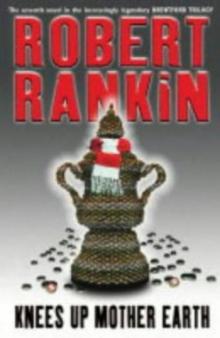 Knees Up Mother Earth bs-7
Knees Up Mother Earth bs-7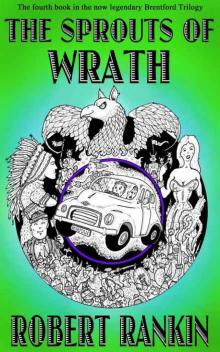 The Sprouts of Wrath (The Brentford Trilogy Book 4)
The Sprouts of Wrath (The Brentford Trilogy Book 4)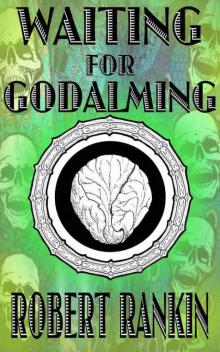 Waiting for Godalming (Completely Barking Mad Trilogy Book 3)
Waiting for Godalming (Completely Barking Mad Trilogy Book 3)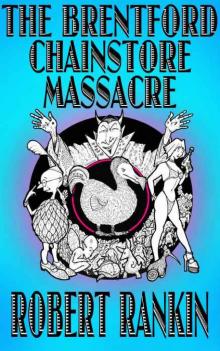 The Brentford Chainstore Massacre (The Brentford Trilogy Book 5)
The Brentford Chainstore Massacre (The Brentford Trilogy Book 5)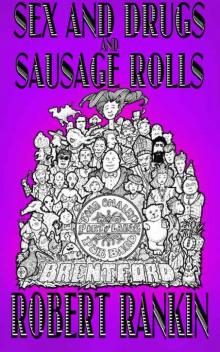 Sex and Drugs and Sausage Rolls (The Brentford Trilogy Book 6)
Sex and Drugs and Sausage Rolls (The Brentford Trilogy Book 6)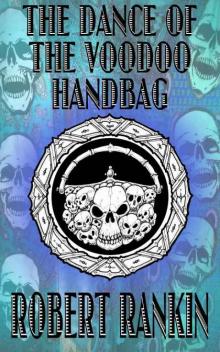 The Dance of the Voodoo Handbag (Completely Barking Mad Trilogy Book 2)
The Dance of the Voodoo Handbag (Completely Barking Mad Trilogy Book 2)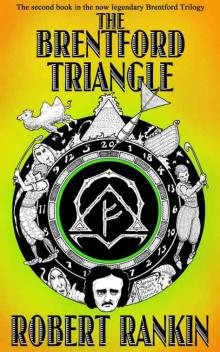 The Brentford Triangle (The Brentford Trilogy Book 2)
The Brentford Triangle (The Brentford Trilogy Book 2)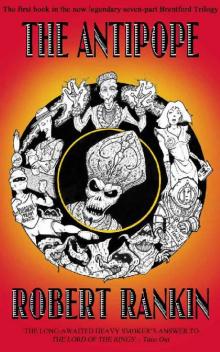 The Antipope (The Brentford Trilogy Book 1)
The Antipope (The Brentford Trilogy Book 1)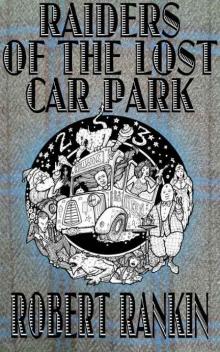 Raiders of the Lost Car Park (The Cornelius Murphy Trilogy Book 2)
Raiders of the Lost Car Park (The Cornelius Murphy Trilogy Book 2)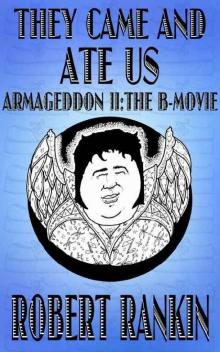 They Came and Ate Us - Armageddon II_The B-Movie (Armageddon Trilogy Book 2)
They Came and Ate Us - Armageddon II_The B-Movie (Armageddon Trilogy Book 2)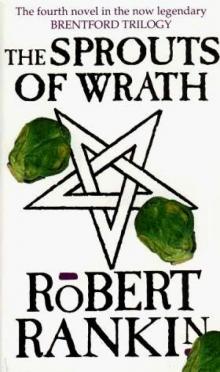 The Sprouts of Wrath bs-4
The Sprouts of Wrath bs-4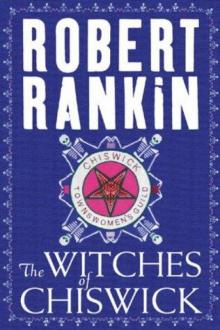 The Witches of Chiswick
The Witches of Chiswick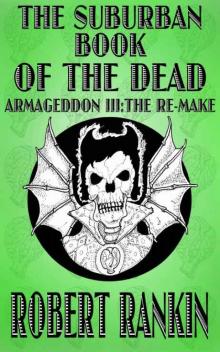 The Suburban Book of the Dead - Armageddon III: The Remake (Armageddon Trilogy 3)
The Suburban Book of the Dead - Armageddon III: The Remake (Armageddon Trilogy 3)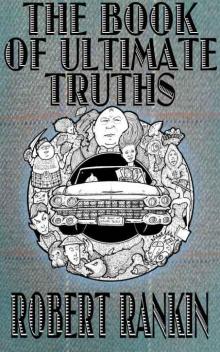 The Book of Ultimate Truths (The Cornelius Murphy Trilogy 1)
The Book of Ultimate Truths (The Cornelius Murphy Trilogy 1)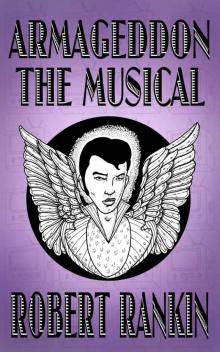 Armageddon: The Musical (Armageddon Trilogy)
Armageddon: The Musical (Armageddon Trilogy)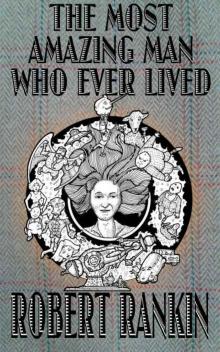 The Most Amazing Man Who Ever Lived (The Cornelius Murphy Trilogy Book 3)
The Most Amazing Man Who Ever Lived (The Cornelius Murphy Trilogy Book 3)